Sarah Gray's Blog, page 3
July 6, 2020
Racontesse Musings… Pity Reads, Pity Reviews
‘Eye-rollingly obvious’ – the first bad review
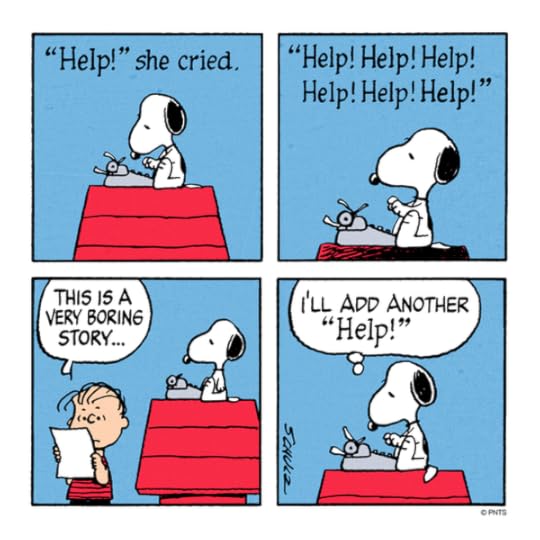
It was harsh. Two stars and a damning commentary. To summarise the review, it argued that my stories were predictable and heavy-handed. It was cringe-worthy and shocking. I kept revisiting it and working through the comments to understand what I'd done wrong. I had completely underestimated the Goodreads’ warning that their reviewers are passionate and honest. Sometimes brutal.
There is a dash of 'emperor’s new clothes' about reviews from friends and associates. People are kind and supportive, they want to see your work succeed, despite their own tastes and sensibilities. It's no secret that I'm living with MND. It's a harsh companion and nearly every aspect of my life has changed. But one of my biggest fears is that friends read my work out of pity. That they write kind reviews because they want to ease the horror of my living with a life limiting disease. I don't want that, it's important my work stands for itself whether it's judged to be good, bad or indifferent. I'd never want anyone to pity read my stories. And definitely not write a pity review.
It's horrible to read a bad review but writers and artists have to let their work go to live an independent life, one separate from its creator; the comments and reviews entirely stand apart. I write what interests me and explore it to the utmost of my ability. I can't do anymore than that – I have no control over the judgements of others and am happy to see my stories take their place in the world and dearly hope they are appreciated for themselves.
Sarah Gray
6 July 2020
June 29, 2020
Racontesse Musings… Channelling the Terminator
Pollyanna

If it wasn't for voice-activation software or devices, I wouldn't be able to do anything independently. It's a miracle of technology! I can read books via Kindle on my laptop, I can send and receive emails and write my stories. I'm alive! The drawback is that it is exhausting. Navigating various columns in social media takes patience – I have to tell the software to do everything that would usually be done so easily by hand. The software often doesn't understand what I'm saying and I have to go back over everything I write.
A simple response on Facebook or Twitter can take 10 minutes.
I write the sentence. Some of the words are wrong – I go over it to correct and the entire sentence is deleted. I start again, once again a single word might be wrong, so I attempt to change it. The cursor appears in wrong place and I have to tell it to reposition and then attempt to change the word. Again, the wrong word. Each letter has to be deleted one by one. It misunderstands and again deletes half the sentence. I add a full stop, but it only hears stop and adds the actual word 'stop'. At last, after much rewriting and many mistakes the sentence is complete. To post I have to say 'press key return '. Simple you might think? No, of course not. After it shows up as 'rescue replete ' or 'keep key concern ', finally it works.
Frustrating is only the tip of the iceberg. If I don't engage directly on Facebook, please don't take it personally.
Here for your entertainment is an example of naked voice-activated text:
“why can it understand people and I don't want it. To . It a complete mess and takes patient press PS I do and time to get it right and now I'm trying to demonstrate how rubbish is, it doing everything right. That just typical of this bloody software, trying to warn me of her first.
Do you see what I mean. Now?”
I hate complaining. I'm comfortable with my Pollyanna persona when dealing with the outside world – it doesn't help to feel sorry for myself or dwell on the negatives. Last week, the hot weather just knocked me out and I couldn't maintain Pollyanna mode. I had to admit defeat and just rest. But it doesn't last long and I'm soon back channelling my inner Terminator…
I can't be bargained with. I can't be reasoned with. I don't feel pity, or remorse, or fear! And I absolutely will not stop, ever, until I am dead!
Sarah Gray
29 June 2020
June 22, 2020
Racontesse Musings… The Muse
When she's spoken, she's spoken. You have to obey. It's the law of creativity – your epiphany is filling your body with adrenaline and you just know that she's right. It's important to write what interests you. That sounds totally obvious, but I've had a hard lesson recently. A psychoanalyst friend was shocked, that having finished writing Urban Creatures, I announced I knew what the next project was to be: vampires. Definitely. She urged relaxation and recovery. I should give into the creative cycle and wait. Enjoy the moment of having finished a project, she urged. Wait – you will soon fill up.
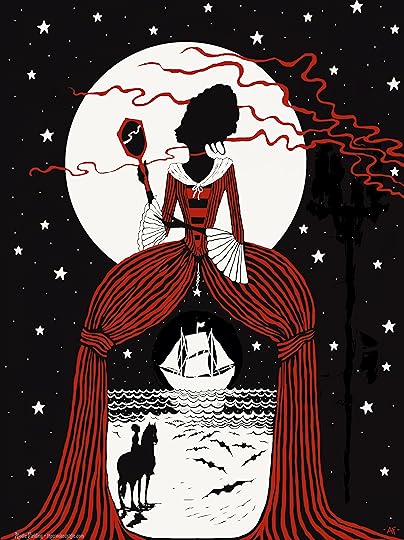
It's a complaint I've often heard writers make – "I've got loads of ideas, I just don't know which one to work on first." None, probably. The death of creativity is to hang on to ideas that don't stimulate you enough to start working on them in the first place. In some ways ideas are easy, you don't really have to do much and they pop into your head. It's easy to be swayed and seduced because they're just that, ideas without form or construct. The Muse doesn't work this way. Ideas need to grow and mature. A little research and reading should be undertaken just to make sure you're headed in the right direction. I won't be writing about vampires in the near future precisely because having done some reading, I'm just not that into them. The Muse doesn't visit on a whim, she needs to see you've done a bit of work, know you're committed – and only then does she come a-knocking.
One day the project you're toying with will solidify. There's no doubt when that moment comes. You will know how to start and it will burgeon. Sure, there will be loads you have to work out and work through. It will feel right and sit well on your shoulders. The other projects will just fade away falling into the category of 'I've always wanted to write a novel about… [insert topic here]."
As well as the classic literary vampire, there's still some more contemporary vampire fiction, I enjoy feasting on; the sexy and amusing, True Blood, the elegant and quirky, Let The Right One In and of course, those crazy comedy vampires from What We Do In The Shadows. So apologies Gentlewoman Vampire, I will live to tell your tale another day.
Sarah Gray
21 June 2020
Featured artwork by Alodie Fielding
June 13, 2020
Racontesse Musings... Struggling to start, struggling to stop
Procrastination is a curse and perfectionism is a grind.

Have you ever sat staring out of the window knowing there's something you want to do, but you just can't seem to drag yourself away from the freedom of daydreaming? If you're a human being, I bet this is quite a regular occurrence. If you're writer it can feel like an exhausting fight between wanting a quiet life and being harassed by that nagging need to write.
For me just opening a new document breaks the curse. Once it's open, I type – anything relevant to get started. The quality doesn't matter. It's just a string of notes that represent the greater whole. Banish your guilt. Daydreaming is an integral part of creativity – it's where your brain coalesces nonsense into product.
Where I struggle is the first complete draft. It's a torturous grind. I accept the first draft will be total rubbish. First drafts are just to get everything down, everything in your brain out onto the page. But it's just so bloody difficult – akin to crawling across the desert without water or any hope of imminent rescue. Scene after scene, I go through the same battle every time, "Why! Why! Why am I doing this to myself!" And then one day after traversing hot sands it exists.
I love editing. It's fun, it's playful and joyous. It's where the raw clay, pulled into shape, finally lives. Working with an editor, your trusted ally at arms you work, draft after draft until your story is the best it can be. But when do you stop? There's always a temptation to keep going back. A sneaky midnight peek, just to make sure the reader will understand, that the story is doing the work you intended it to do.
It's essential to trust yourself and your editor. Put the keyboard down and walk away. If you don't it could send you mad. Did I use too many 'buts ', does that sentence have one too many clauses, have I perfected it yet? No. It's never going to be perfect and what does perfection mean anyway – it's subjective. Once the final proof read has been done, I never look at my stories again. I wouldn't be that cruel to myself.
You have no control over how anyone reacts to what you do, so let your work go and let it live in the world without you.
Sarah Gray
13 June 2020
June 6, 2020
Racontesse Musings… Writing competitions
Stupid competitions! I’ll never win. But don’t listen to the poisonous parrot.
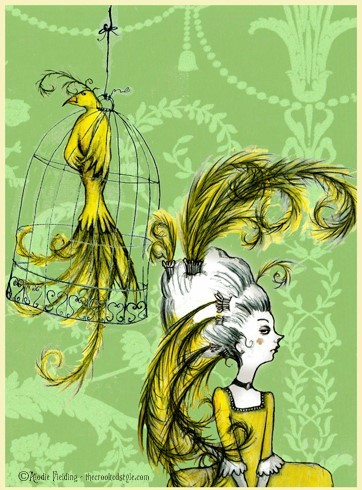
You don't need to win a writing competition to get something out of it. Entering a competition is akin to readying the troops for war. Resources, supply line and strategy all have to be meticulously thought out and planned.
Firstly, the competition criteria requires assessment. If the competition has a theme then the likelihood of having anything already suitable is exceptionally unlikely. For example, in these times of lockdown, some of the smaller competitions are asking for stories about community and compassion. This isn't my bag at all. I'm never going be able to write something that fits this brief. It just isn't interesting to me.
Secondly, which categories are available; flash fiction, short story, life writing or novel. This should be straightforward but different competitions tend to ask for varying word counts. Flash fiction for example has a wide definition. For some competitions a piece of flash fiction is considered anything under 300 words, for some 250 and for others under a thousand. Again, it is unlikely to have anything immediately available at the right word count to enter straight away.
Cost is a huge factor. Obviously, the bigger the competition the more it costs to enter. I entered the Bridport Prize and ended up spending £54 on fees. Ouch! It's a lot of money and if you're doing that a few times throughout the year it can get pretty expensive.
When planning, I take on the role of Major General. I decide well in advance which competitions I'm going to enter. I make sure I understand the entry requirement and rules – I commit these to memory so I don't get any nasty surprises. I budget and plan my entry strategy for the coming months. Having chosen which categories I want to submit to, I write accordingly. Winning isn't the point. It's the discipline to write following external rules and deadlines. It's great writing practice and keeps my writing fresh.
I may lose the battle, but I will win the war. I have kept on writing and after time I realise I have a fabulous body of work. Well done me!
Racontesse Musings... Poetry
Lockdown has bought the poets out in force, but poetry appreciation isn't always so easy…

One minute 36 seconds and yet I can't attend. Don't get me wrong, I love poetry I really do – is there any other form that allows us to be so heartfelt and present. But, why does my attention always drift? I try to listen to the poetry voice, the one that is super earnest, hanging on the words, drawing them out, lingering so metaphors (the endless metaphors) can truly live, allowing the meaning to be fully contemplated. "Stuffed peppers for tea" is where my mind has wandered, creeping in the opposite direction from the mysteries and tragedies of the human condition.
To get anything from a poem, I have to be very stern with myself, "Come on brain, don't worry, the hard work will be over soon enough. Then you can have a treat," by treat, I mean it can get back to daydreaming, travelling to places unrestrained; inspired by the view from the window, or a longing for crisps.
I make space for the poem and sit without distraction and work through it line by line. This may sound like a joyless process; I assure you it's not. It gives me focus and for those moments I am actually 'mindful '. Imagine, genuine concentration! I'm exercising mindfulness with the added benefit of learning something at the same time. By committing the poems to memory, I can explore the scansion, choice of words and meaning. I can contemplate individual phrases easily, without referring to the page. Often, on sleepless nights, I speak the phrases over and over to entertain myself while staring out of the window at the stars.
The overwhelming benefit of learning poetry by heart is that my poetry voice is of my own choosing, there are no over earnest and alienating peaks and troughs or random lingerings – definitely not. My lazy, crisp-starved brain gets to make sense of it all by itself.
Sarah Gray
31 May 2020
June 1, 2020
Racontesse Musings
Lockdown has bought the poets out in force, but poetry appreciation isn't always so easy…

One minute 36 seconds and yet I can't attend. Don't get me wrong, I love poetry I really do – is there any other form that allows us to be so heartfelt and present. But, why does my attention always drift? I try to listen to the poetry voice, the one that is super earnest, hanging on the words, drawing them out, lingering so metaphors (the endless metaphors) can truly live, allowing the meaning to be fully contemplated. "Stuffed peppers for tea" is where my mind has wandered, creeping in the opposite direction from the mysteries and tragedies of the human condition.
To get anything from a poem, I have to be very stern with myself, "Come on brain, don't worry, the hard work will be over soon enough. Then you can have a treat," by treat, I mean it can get back to daydreaming, travelling to places unrestrained; inspired by the view from the window, or a longing for crisps.
I make space for the poem and sit without distraction and work through it line by line. This may sound like a joyless process; I assure you it's not. It gives me focus and for those moments I am actually 'mindful '. Imagine, genuine concentration! I'm exercising mindfulness with the added benefit of learning something at the same time. By committing the poems to memory, I can explore the scansion, choice of words and meaning. I can contemplate individual phrases easily, without referring to the page. Often, on sleepless nights, I speak the phrases over and over to entertain myself while staring out of the window at the stars.
The overwhelming benefit of learning poetry by heart is that my poetry voice is of my own choosing, there are no over earnest and alienating peaks and troughs or random lingerings – definitely not. My lazy, crisp-starved brain gets to make sense of it all by itself.
Sarah Gray
31 May 2020
February 10, 2020
The Art of Illustrating Words
Urban Creatures is set for an April launch. In anticipation, I talked to Alodie Fielding about her spooky, marvellous and magical inspirations and how she approaches illustrating my short story collections.
The first time I saw Alodie's work, I knew I wanted her to illustrate my books. Her market stall was full of wonderful jewellery, cards and artwork: I had discovered hidden treasure. It was obvious we shared the same taste and sensibility. To achieve my ambition of making my books a complete work, a thing of beauty to be cherished has been achieved through a fruitful creative collaboration of supportive publisher, a sympathetic designer and a talented artist.
Alodie has been kind enough to share her step-by-step development of the cover for Urban Creatures.
[image error]
What inspires your artwork and how did you develop your unique style?
A sense of humour and the absurd is very important to me. My style of executing the work may have changed and developed over time, but the content hasn’t really changed. So basically, I've always had an over-active imagination, and it has to come out somewhere, somehow.
I have always loved reading since I was young, particularly
I remember several books my mum had as a girl, which contained really frightening artwork in them. They weren’t meant to be scary, but as a young kid, they were. All these things have had a big influence on my work and the same themes have recurred time after time.
1, 2 & 3 - I start with initial sketches and work until I get a design I like, and then make more detailed drawings. I scan the different images as layers into Photoshop. I like to get as many real textures and brush marks as possible into the original drawings and scans.
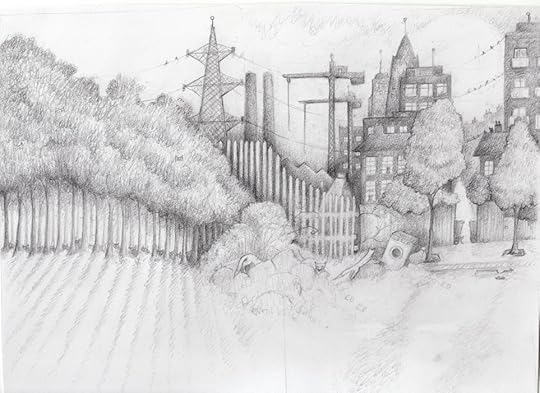
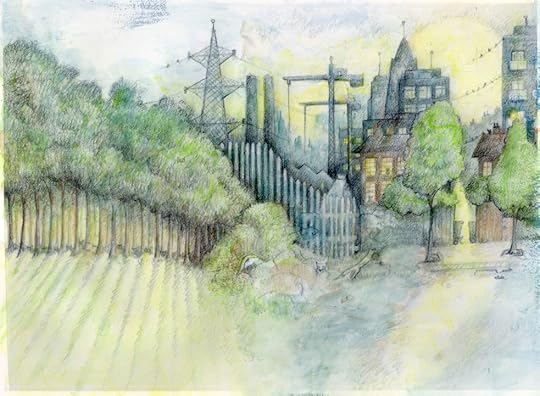
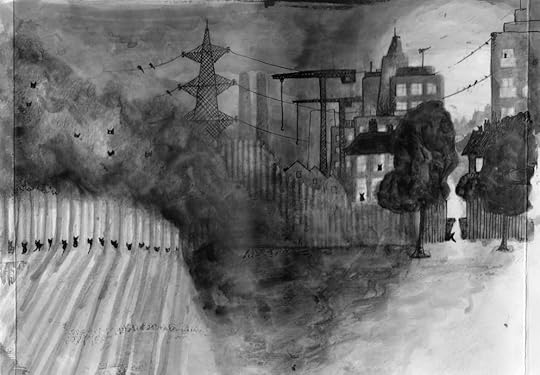
As a kid, I used to play outside with my friends all the time and we would spend whole summers outdoors on our bikes, building flimsy dens on Tooting Bec Common, making up adventures as we went. All this was done in sight of the oppressive Tooting Bec Mental Hospital (now gone), with its metal walkways and Victorian architecture. Various outpatients would also spend their days on the common, which added a tinge of peril.
Another influence looking back, was my mum’s mum. She would always tell me stories of when she was a young girl and I used to love listening to her go off into her past. When I stayed with her, we would look through her photos (or snaps, as she called them), the same routine every time. I think this gave me a romantic, sometimes wistful view of the past, which I think has affected my work.
My granny was also one for old wives tales. I still daren’t do any laundry on New Years Day, give gloves as a present or do numerous other things for fear of retribution.
4 & 5 - Sometimes I will print out the image onto paper and draw directly onto it with ink or pencil. I then wrap it around a similar size book to make sure the composition works as a cover.
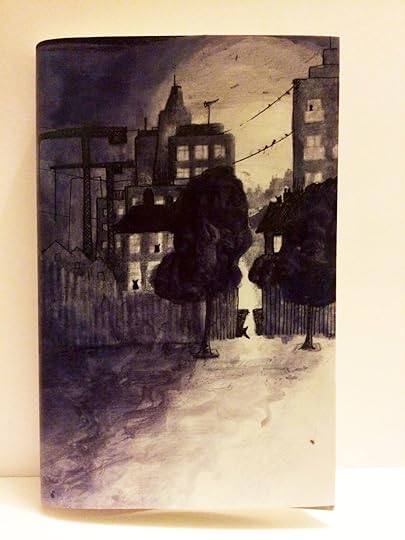
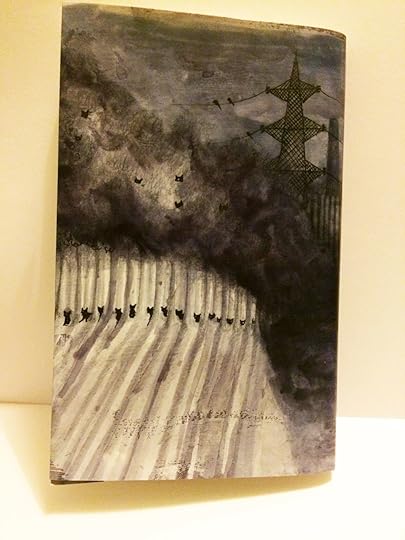
Why do you think your artwork works so well alongside Sarah's stories?
I think it helps that we have a similar taste in imagery and are both drawn to history, and a slightly weird and gothic fantasy, fairytale world. Sarah saw me selling my work at a craft market and so I think that also helps a great deal, as she must have seen something in me and my work that spoke to her. Then when I read her stories, I felt a similar thing. It just works. It also helps that Sarah has a very clear vision of what she wants and conveys it very well.
6 - All the final layers are scanned and flattened. I took out the middle section and re-drew a lot of this image, as originally it was intended to have three panels with a pull out cover.
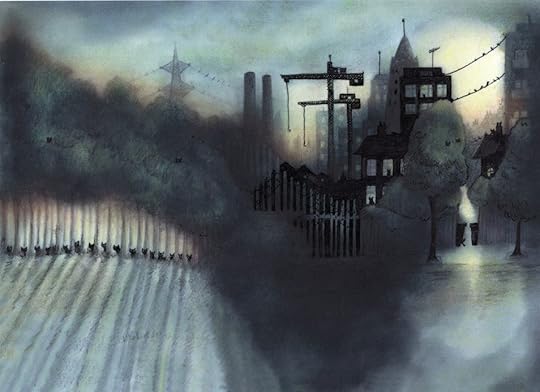
How do you collaborate with Sarah practically and creatively?
We start with the cover and discuss ideas. I like the cover to convey the mood of the book without necessarily referring to any individual story. We usually discuss the book contents, the feel and mood of the book. I do some rough sketches to make sure she is happy with the direction the artwork is taking. The illustrations inside the book are usually more specific to each story. Sarah will send me a few sentences about each story, so that I get a general idea about each one. She will often send me photos and pictures of imagery she likes, like a mood board. I use these as signposts. I don’t copy them, but they are useful guides as parameters to stay within while designing the image.
I don’t often read the whole story until I see the final published book, but sometimes Sarah will give me a finished story, or will give me more detail if I need it, as some images are harder to pin down than others.
Sarah is great to work with because she is very clear on what she wants and conveys it really well. She will also listen and consider alternatives, so if I suggest that something else might work better as an image she will take it on board. It is very important that this works both ways as I think the work is better for it.
How does your process differ when working on book illustrations?
It is always important to be true to yourself and your style of work when working for yourself and for others. If the author/publisher doesn’t understand that, it can be hard, particularly if they have a specific style or image in mind. The great thing about Sarah is that I know she likes the style I work in and this gives me a lot more confidence to be imaginative and creative.
As an illustrator working for someone else, you want to be true to yourself, but you also have to remember that ultimately the author’s words need to be respected. It can be a challenge to try to interpret another person’s thoughts and their world through your own imagery, but it is very rewarding when it works. Sometimes you have to curb your impulse to add other things or go off on another tangent and pull things back to remain true to the author's vision.
On a very practical level, it is also important to remember that you are creating a cover for a book, so when you are composing the cover image, you need to leave areas for the text and other bits and pieces to be inserted. In a way it can be good to have certain restrictions placed on you, as it can make you think outside of your own limitations, by making you have to think in another way. By being challenged and using your problem solving abilities makes you produce better work in the long run.
To see more of Alodie's beautiful work visit her website;
Urban Creatures is published by
February 4, 2020
Hustlers: Playing the Wolves at their own Game
We’re all used to the predictable movie images of exotic dancers, but these women bite back. In her 2019 film, Hustlers, Lorene Scafaria shows that women can dance to their own tune.

'Get them! Get the men, screw them for all they've got! 'I was shouting at the screen.
Written and directed by Lorene Scafaria, Hustlers completely subverts the stereotypical portrayals of exotic dancers. Sure, the opening shots are of tens of semi-clad women writhing astride punters and opening their legs leaving little to the imagination. It's what happens next that changes the story. A dressing room scene shows that the women are friends; they count on one another, giving advice and sympathy, even feeling each other's tits to assess the quality of plastic surgery. The women are at the centre of the story, not second fiddle to men. They are funny, cool and most importantly complex characters.
Destiny, (Constance Wu), is a newbie dancer who is taken under the wing of the club's highest earner, Ramona, (Jennifer Lopez). Ramona knows how to work it. It's all about understanding the client, their position in the food chain and how much they'll be able to spend. At first, times are good, but after the crash of 2008, the money dries up. The women lose contact and attempt to make money at regular jobs. Without experience, Destiny finds it tough and returns to the club, but the playboys aren't playing. It's when Destiny and Ramona re-unite, they hatch a plan to scam the punters for every dime.
The Wolf of Wall Street portrays women as expendable objects to be bought and sold; this is what happens to women who don't have agency or power. The hustlers fight to be independent and stay independent. These are not pitiable damsels in distress waiting for a man with a big gun to come and rescue them – it’s something I’ve tried to reflect in my own writing.
Watching Orange is the New Black for the first time, gave rise to similar strong emotions. It felt unfamiliar, but engrossing, funny and at the same time tragic. It was almost a shock to see women as human beings with multifaceted personalities. The authenticity of both Hustlers and Orange spills out of the screen and this may be due to the fact that both are derived from true experiences. Hustlers is based on the New York magazine's article

The extent of my shock at watching both of these is embarrassing and uncomfortable. I'm so unused to watching an ensemble of women at the centre of a story, leading lives that women aren't supposed to on-screen or off. It's not about love or being a good mum or a princess, even if you are kick arse. This is a chicken and egg scenario. I think at one point in my life I felt any woman using her body to make money was deserving of sympathy and clearly hadn't made a rational decision or didn't have the social or economic advantages to undertake a 'career '. Of course, poor things! Stupid me!
Given Hustlers and Orange as I’ve relayed above, it’s surprising that not one film directed by a woman has been nominated for an Oscar this year and only one for best film, Little Women, (Dir. Amy Pascal) - it's not for the want of quality films made by women,
Check out this year’s
For an amusing and informative read about the relationship between sex and power check out;
October 6, 2019
Jeff Wayne's musical version of
The War of the Worlds – The Immersive Experience
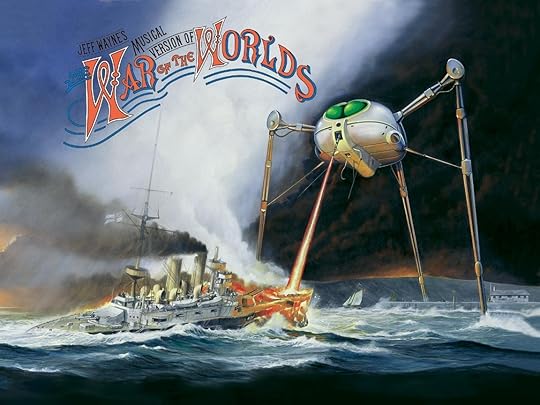 We are ushered into a Victorian style theatre where the narrator begins his chilling tale:Intellects vast and cool and unsympathetic, regarded this earth with envious eyes and slowly but surely drew their plans against us…The music kicks in, it's so loud it reverberates through my chest, lights flash, excitement grips and anticipation builds. Terror tingling throughout my body, the singing warns,The chances of anything coming from Mars is a million to one, they said. But still they come!We become part of humanities survivors and are lead post-haste by live-action characters through a world being ravaged by Martian invaders. At the Astrologer’s Lab we observe strange lights coming from Mars and then on to Woking common where we first encounter the Martian pod. Live-action is replaced by Virtual Reality. Alien tripods loom above us shooting their chemical rays destroying the defending army.The War of the Worlds immersive experience is a success. A combination of live action, video and VR technology creates a thrilling world embodying the spirit of Jeff Wayne's interpretation. True to the original album's artwork, the classic steam punk production design won't disappoint fans either.Up close and personal performances by individual actors was a little intense and I had to get over my Britishness to embrace the storytelling and become part of the experience. Warning! The VR technology is so incredibly good at simulating motion that some participants have been known to vomit. Especially those worse for wear.Original fans of the novel, the album and newcomers alike will be thrilled by this immersive adventure. Be prepared to fight for your survival, the Martians are coming!Bookings are being taken throughout October and November.https://www.dotdot.london/For more information about the novel by HG Wells, follow the link below:https://en.wikipedia.org/wiki/The_War_of_the_WorldsA BBC adaptation of The War of the Worlds is coming to our screens this autumn.https://www.radiotimes.com/news/2019-10-03/when-is-the-war-of-the-worlds-on-tv-who-is-in-the-cast/
We are ushered into a Victorian style theatre where the narrator begins his chilling tale:Intellects vast and cool and unsympathetic, regarded this earth with envious eyes and slowly but surely drew their plans against us…The music kicks in, it's so loud it reverberates through my chest, lights flash, excitement grips and anticipation builds. Terror tingling throughout my body, the singing warns,The chances of anything coming from Mars is a million to one, they said. But still they come!We become part of humanities survivors and are lead post-haste by live-action characters through a world being ravaged by Martian invaders. At the Astrologer’s Lab we observe strange lights coming from Mars and then on to Woking common where we first encounter the Martian pod. Live-action is replaced by Virtual Reality. Alien tripods loom above us shooting their chemical rays destroying the defending army.The War of the Worlds immersive experience is a success. A combination of live action, video and VR technology creates a thrilling world embodying the spirit of Jeff Wayne's interpretation. True to the original album's artwork, the classic steam punk production design won't disappoint fans either.Up close and personal performances by individual actors was a little intense and I had to get over my Britishness to embrace the storytelling and become part of the experience. Warning! The VR technology is so incredibly good at simulating motion that some participants have been known to vomit. Especially those worse for wear.Original fans of the novel, the album and newcomers alike will be thrilled by this immersive adventure. Be prepared to fight for your survival, the Martians are coming!Bookings are being taken throughout October and November.https://www.dotdot.london/For more information about the novel by HG Wells, follow the link below:https://en.wikipedia.org/wiki/The_War_of_the_WorldsA BBC adaptation of The War of the Worlds is coming to our screens this autumn.https://www.radiotimes.com/news/2019-10-03/when-is-the-war-of-the-worlds-on-tv-who-is-in-the-cast/



